2022届高考英语二轮复习:词汇词根词缀词源联想记忆(三)学案
文档属性
| 名称 | 2022届高考英语二轮复习:词汇词根词缀词源联想记忆(三)学案 |
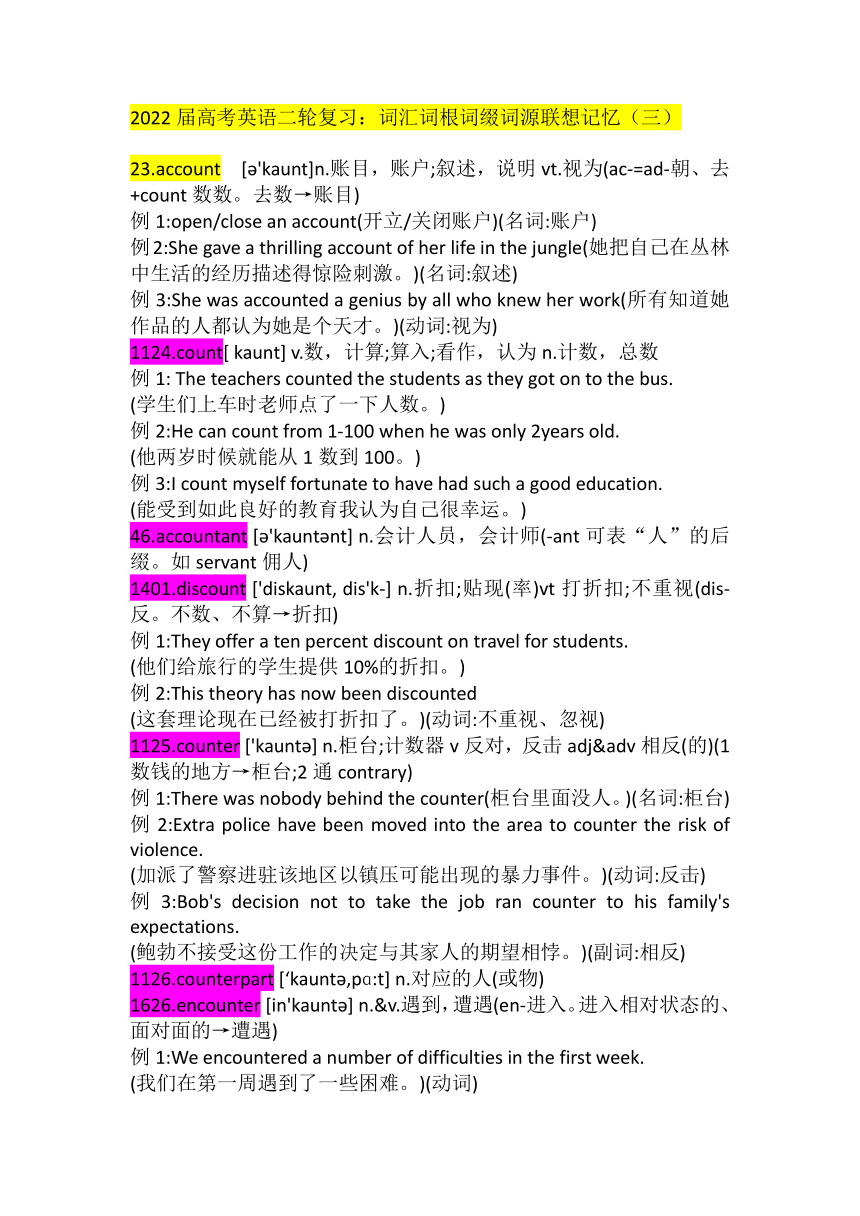
|
|
| 格式 | doc | ||
| 文件大小 | 99.5KB | ||
| 资源类型 | 教案 | ||
| 版本资源 | 通用版 | ||
| 科目 | 英语 | ||
| 更新时间 | 2021-10-06 18:06:05 | ||
图片预览

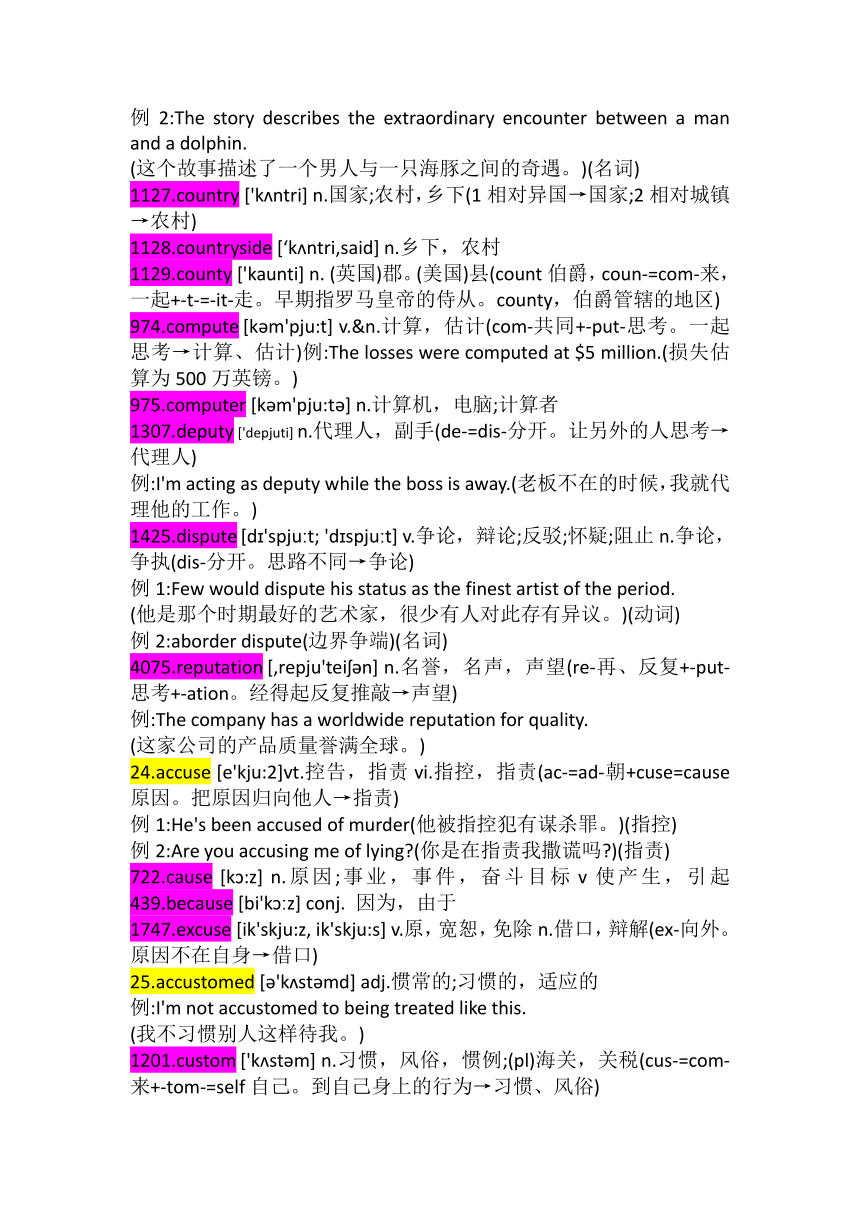
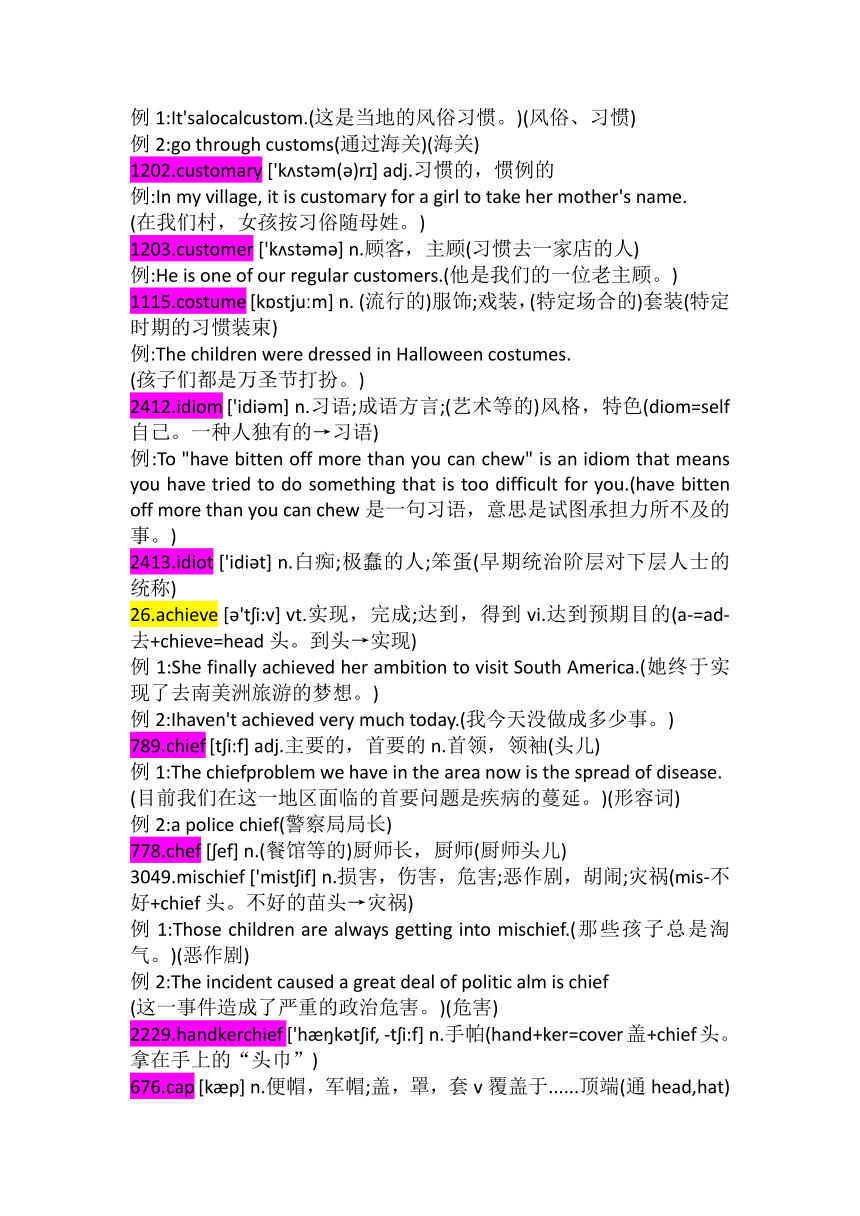
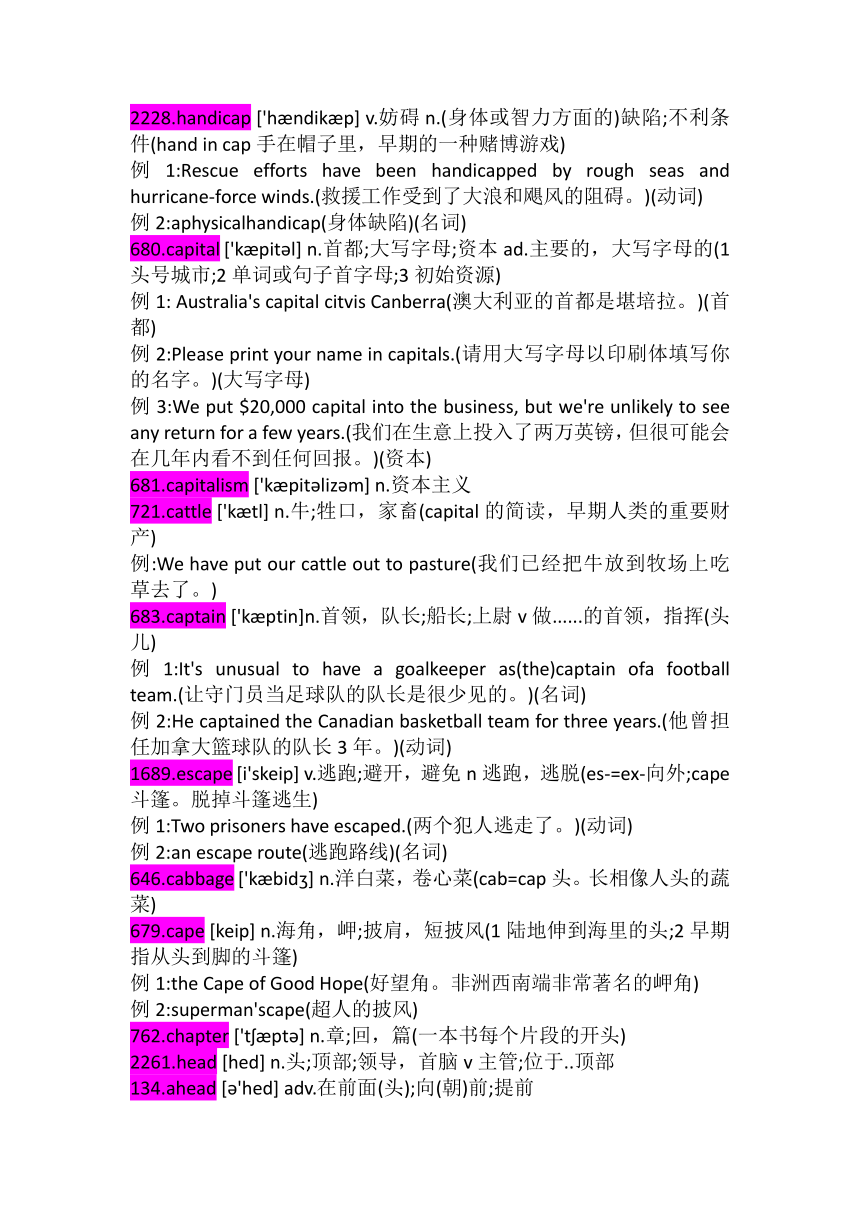
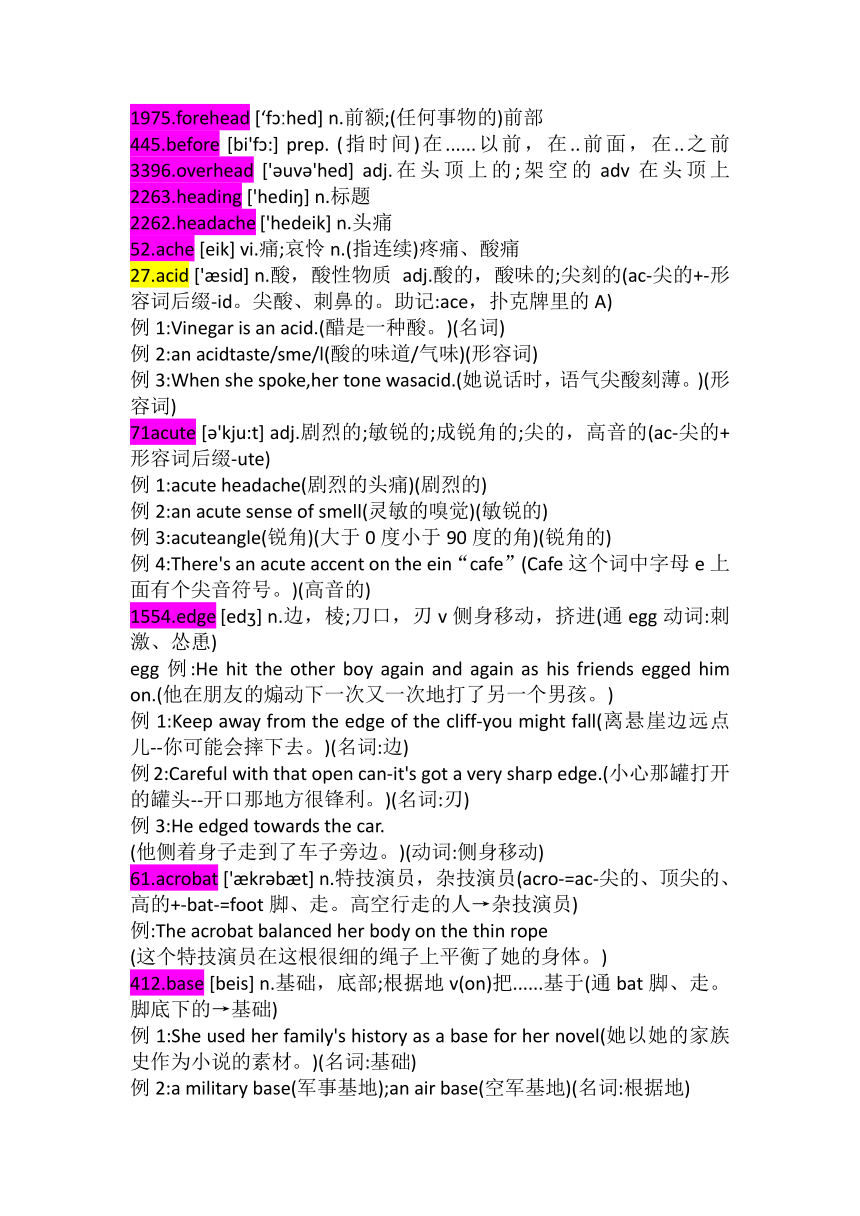
文档简介
2022届高考英语二轮复习:词汇词根词缀词源联想记忆(三)
23.account
[ 'kaunt]n.账目,账户;叙述,说明vt.视为(ac-=ad-朝、去+count数数。去数→账目)
例1:open/close
an
account(开立/关闭账户)(名词:账户)
例2:She
gave
a
thrilling
account
of
her
life
in
the
jungle(她把自己在丛林中生活的经历描述得惊险刺激。)(名词:叙述)
例3:She
was
accounted
a
genius
by
all
who
knew
her
work(所有知道她作品的人都认为她是个天才。)(动词:视为)
1124.count[
kaunt]
v.数,计算;算入;看作,认为n.计数,总数
例1:
The
teachers
counted
the
students
as
they
got
on
to
the
bus.
(学生们上车时老师点了一下人数。)
例2:He
can
count
from
1-100
when
he
was
only
2years
old.
(他两岁时候就能从1数到100。)
例3:I
count
myself
fortunate
to
have
had
such
a
good
education.
(能受到如此良好的教育我认为自己很幸运。)
46.accountant
[ 'kaunt nt]
n.会计人员,会计师(-ant可表“人”的后缀。如servant佣人)
1401.discount
['diskaunt,
dis'k-]
n.折扣;贴现(率)vt打折扣;不重视(dis-反。不数、不算→折扣)
例1:They
offer
a
ten
percent
discount
on
travel
for
students.
(他们给旅行的学生提供10%的折扣。)
例2:This
theory
has
now
been
discounted
(这套理论现在已经被打折扣了。)(动词:不重视、忽视)
1125.counter
['kaunt ]
n.柜台;计数器v反对,反击adj&adv相反(的)(1数钱的地方→柜台;2通contrary)
例1:There
was
nobody
behind
the
counter(柜台里面没人。)(名词:柜台)
例2:Extra
police
have
been
moved
into
the
area
to
counter
the
risk
of
violence.
(加派了警察进驻该地区以镇压可能出现的暴力事件。)(动词:反击)
例3:Bob's
decision
not
to
take
the
job
ran
counter
to
his
family's
expectations.
(鲍勃不接受这份工作的决定与其家人的期望相悖。)(副词:相反)
1126.counterpart
[‘kaunt ,pɑ:t]
n.对应的人(或物)
1626.encounter
[in'kaunt ]
n.&v.遇到,遭遇(en-进入。进入相对状态的、面对面的→遭遇)
例1:We
encountered
a
number
of
difficulties
in
the
first
week.
(我们在第一周遇到了一些困难。)(动词)
例2:The
story
describes
the
extraordinary
encounter
between
a
man
and
a
dolphin.
(这个故事描述了一个男人与一只海豚之间的奇遇。)(名词)
1127.country
['k ntri]
n.国家;农村,乡下(1相对异国→国家;2相对城镇→农村)
1128.countryside
[‘k ntri,said]
n.乡下,农村
1129.county
['kaunti]
n.
(英国)郡。(美国)县(count伯爵,coun-=com-来,一起+-t-=-it-走。早期指罗马皇帝的侍从。county,伯爵管辖的地区)
pute
[k m'pju:t]
v.&n.计算,估计(com-共同+-put-思考。一起思考→计算、估计)例:The
losses
were
computed
at
$5
million.(损失估算为500万英镑。)
puter
[k m'pju:t ]
n.计算机,电脑;计算者
1307.deputy
['depjuti]
n.代理人,副手(de-=dis-分开。让另外的人思考→代理人)
例:I'm
acting
as
deputy
while
the
boss
is
away.(老板不在的时候,我就代理他的工作。)
1425.dispute
[d 'spju t;
'd spju t]
v.争论,辩论;反驳;怀疑;阻止n.争论,争执(dis-分开。思路不同→争论)
例1:Few
would
dispute
his
status
as
the
finest
artist
of
the
period.
(他是那个时期最好的艺术家,很少有人对此存有异议。)(动词)
例2:aborder
dispute(边界争端)(名词)
4075.reputation
[,repju'tei n]
n.名誉,名声,声望(re-再、反复+-put-思考+-ation。经得起反复推敲→声望)
例:The
company
has
a
worldwide
reputation
for
quality.
(这家公司的产品质量誉满全球。)
24.accuse
[e'kju:2]vt.控告,指责vi.指控,指责(ac-=ad-朝+cuse=cause原因。把原因归向他人→指责)
例1:He's
been
accused
of
murder(他被指控犯有谋杀罪。)(指控)
例2:Are
you
accusing
me
of
lying (你是在指责我撒谎吗 )(指责)
722.cause
[k :z]
n.原因;事业,事件,奋斗目标v使产生,引起439.because
[bi'k z]
conj.
因为,由于
1747.excuse
[ik'skju:z,
ik'skju:s]
v.原,宽恕,免除n.借口,辩解(ex-向外。原因不在自身→借口)
25.accustomed
[ 'k st md]
adj.惯常的;习惯的,适应的
例:I'm
not
accustomed
to
being
treated
like
this.
(我不习惯别人这样待我。)
1201.custom
['k st m]
n.习惯,风俗,惯例;(pl)海关,关税(cus-=com-来+-tom-=self自己。到自己身上的行为→习惯、风俗)
例1:It'salocalcustom.(这是当地的风俗习惯。)(风俗、习惯)
例2:go
through
customs(通过海关)(海关)
1202.customary
['k st m( )r ]
adj.习惯的,惯例的
例:In
my
village,
it
is
customary
for
a
girl
to
take
her
mother's
name.
(在我们村,女孩按习俗随母姓。)
1203.customer
['k st m ]
n.顾客,主顾(习惯去一家店的人)
例:He
is
one
of
our
regular
customers.(他是我们的一位老主顾。)
1115.costume
[k stju m]
n.
(流行的)服饰;戏装,(特定场合的)套装(特定时期的习惯装束)
例:The
children
were
dressed
in
Halloween
costumes.
(孩子们都是万圣节打扮。)
2412.idiom
['idi m]
n.习语;成语方言;(艺术等的)风格,特色(diom=self自己。一种人独有的→习语)
例:To
"have
bitten
off
more
than
you
can
chew"
is
an
idiom
that
means
you
have
tried
to
do
something
that
is
too
difficult
for
you.(have
bitten
off
more
than
you
can
chew是一句习语,意思是试图承担力所不及的事。)
2413.idiot
['idi t]
n.白痴;极蠢的人;笨蛋(早期统治阶层对下层人士的统称)
26.achieve
[ 't i:v]
vt.实现,完成;达到,得到vi.达到预期目的(a-=ad-去+chieve=head头。到头→实现)
例1:She
finally
achieved
her
ambition
to
visit
South
America.(她终于实现了去南美洲旅游的梦想。)
例2:Ihaven't
achieved
very
much
today.(我今天没做成多少事。)
789.chief
[t i:f]
adj.主要的,首要的n.首领,领袖(头儿)
例1:The
chiefproblem
we
have
in
the
area
now
is
the
spread
of
disease.
(目前我们在这一地区面临的首要问题是疾病的蔓延。)(形容词)
例2:a
police
chief(警察局局长)
778.chef
[ ef]
n.(餐馆等的)厨师长,厨师(厨师头儿)
3049.mischief
['mist if]
n.损害,伤害,危害;恶作剧,胡闹;灾祸(mis-不好+chief头。不好的苗头→灾祸)
例1:Those
children
are
always
getting
into
mischief.(那些孩子总是淘气。)(恶作剧)
例2:The
incident
caused
a
great
deal
of
politic
alm
is
chief
(这一事件造成了严重的政治危害。)(危害)
2229.handkerchief
['h k t if,
-t i:f]
n.手帕(hand+ker=cover盖+chief头。拿在手上的“头巾”)
676.cap
[k p]
n.便帽,军帽;盖,罩,套v覆盖于......顶端(通head,hat)
2228.handicap
['h ndik p]
v.妨碍n.(身体或智力方面的)缺陷;不利条件(hand
in
cap手在帽子里,早期的一种赌博游戏)
例1:Rescue
efforts
have
been
handicapped
by
rough
seas
and
hurricane-force
winds.(救援工作受到了大浪和飓风的阻碍。)(动词)
例2:aphysicalhandicap(身体缺陷)(名词)
680.capital
['k pit l]
n.首都;大写字母;资本ad.主要的,大写字母的(1头号城市;2单词或句子首字母;3初始资源)
例1:
Australia's
capital
citvis
Canberra(澳大利亚的首都是堪培拉。)(首都)
例2:Please
print
your
name
in
capitals.(请用大写字母以印刷体填写你的名字。)(大写字母)
例3:We
put
$20,000
capital
into
the
business,
but
we're
unlikely
to
see
any
return
for
a
few
years.(我们在生意上投入了两万英镑,但很可能会在几年内看不到任何回报。)(资本)
681.capitalism
['k pit liz m]
n.资本主义
721.cattle
['k tl]
n.牛;牲口,家畜(capital的简读,早期人类的重要财产)
例:We
have
put
our
cattle
out
to
pasture(我们已经把牛放到牧场上吃草去了。)
683.captain
['k ptin]n.首领,队长;船长;上尉v做......的首领,指挥(头儿)
例1:It's
unusual
to
have
a
goalkeeper
as(the)captain
ofa
football
team.(让守门员当足球队的队长是很少见的。)(名词)
例2:He
captained
the
Canadian
basketball
team
for
three
years.(他曾担任加拿大篮球队的队长3年。)(动词)
1689.escape
[i'skeip]
v.逃跑;避开,避免n逃跑,逃脱(es-=ex-向外;cape斗篷。脱掉斗篷逃生)
例1:Two
prisoners
have
escaped.(两个犯人逃走了。)(动词)
例2:an
escape
route(逃跑路线)(名词)
646.cabbage
['k bid ]
n.洋白菜,卷心菜(cab=cap头。长相像人头的蔬菜)
679.cape
[keip]
n.海角,岬;披肩,短披风(1陆地伸到海里的头;2早期指从头到脚的斗篷)
例1:the
Cape
of
Good
Hope(好望角。非洲西南端非常著名的岬角)
例2:superman'scape(超人的披风)
762.chapter
['t pt ]
n.章;回,篇(一本书每个片段的开头)
2261.head
[hed]
n.头;顶部;领导,首脑v主管;位于..顶部
134.ahead
[ 'hed]
adv.在前面(头);向(朝)前;提前
1975.forehead
[‘f hed]
n.前额;(任何事物的)前部
445.before
[bi'f :]
prep.
(指时间)在......以前,在..前面,在..之前3396.overhead
[' uv 'hed]
adj.在头顶上的;架空的adv在头顶上2263.heading
['hedi ]
n.标题
2262.headache
['hedeik]
n.头痛
52.ache
[eik]
vi.痛;哀怜n.(指连续)疼痛、酸痛
27.acid
[' sid]
n.酸,酸性物质
adj.酸的,酸味的;尖刻的(ac-尖的+-形容词后缀-id。尖酸、刺鼻的。助记:ace,扑克牌里的A)
例1:Vinegar
is
an
acid.(醋是一种酸。)(名词)
例2:an
acidtaste/sme/l(酸的味道/气味)(形容词)
例3:When
she
spoke,her
tone
wasacid.(她说话时,语气尖酸刻薄。)(形容词)
71acute
[ 'kju:t]
adj.剧烈的;敏锐的;成锐角的;尖的,高音的(ac-尖的+形容词后缀-ute)
例1:acute
headache(剧烈的头痛)(剧烈的)
例2:an
acute
sense
of
smell(灵敏的嗅觉)(敏锐的)
例3:acuteangle(锐角)(大于0度小于90度的角)(锐角的)
例4:There's
an
acute
accent
on
the
ein“cafe”(Cafe这个词中字母e上面有个尖音符号。)(高音的)
1554.edge
[ed ]
n.边,棱;刀口,刃v侧身移动,挤进(通egg动词:刺激、怂恿)
egg例:He
hit
the
other
boy
again
and
again
as
his
friends
egged
him
on.(他在朋友的煽动下一次又一次地打了另一个男孩。)
例1:Keep
away
from
the
edge
of
the
cliff-you
might
fall(离悬崖边远点儿--你可能会摔下去。)(名词:边)
例2:Careful
with
that
open
can-it's
got
a
very
sharp
edge.(小心那罐打开的罐头--开口那地方很锋利。)(名词:刃)
例3:He
edged
towards
the
car.
(他侧着身子走到了车子旁边。)(动词:侧身移动)
61.acrobat
[' kr b t]
n.特技演员,杂技演员(acro-=ac-尖的、顶尖的、高的+-bat-=foot脚、走。高空行走的人→杂技演员)
例:The
acrobat
balanced
her
body
on
the
thin
rope
(这个特技演员在这根很细的绳子上平衡了她的身体。)
412.base
[beis]
n.基础,底部;根据地v(on)把......基于(通bat脚、走。脚底下的→基础)
例1:She
used
her
family's
history
as
a
base
for
her
novel(她以她的家族史作为小说的素材。)(名词:基础)
例2:a
military
base(军事基地);an
air
base(空军基地)(名词:根据地)
例3:This
film
is
based
on
a
true
story(这部电影是根据真实事件改编的。)(动词:把......基于)
例4:Where
is
your
firm
based (你们公司在哪儿 )(动词:把......基于)
414.basement
['beism nt]
n.建筑物的底部,地下室,地窖
415.basic
['beisik]
adj.基本的,基础的
417.basis
['beisis]
n.基础,根据
例:We
judge
a
worker
on
the
basis
of
his
performance.(我们判断一个工人的基础是看他的表现。)
28.acknowledge
[ k'n lid ]
vt.承认;公认;告知(信件等的)收到;答谢(ac-朝、去+knowledge知道→去告诉别人自己知道了)
例1:They
acknowledged
that
the
decision
was
a
mistake
(他们承认这个决定是错误的。)(承认)
例2:Historians
generally
acknowledge
her
as
a
genius
in
the
feld(历史学家们公认她是该领域中的天才。)(公认)
例3:Please
acknowledge
receipt
of
this
letter
(收到此信,请复函告知。)(告知收到)
例4:Igratefully
acknowledge
financial
support
from
several
local
businesses.(我对本地几家企业的资助表示感谢。)(答谢)
2704.knowledge
['n lid ]
n.知识,学识;知道,了解
例1:Knowledge
is
power(知识就是力量。)
例2:To
the
best
of
my
knowledge,
he
didn't
make
these
comments.
(据我所知,他没这么说过。)
2703.know
[n u]
vt.知道,了解;认识;识别vi.知道,了解
5376well-known
['wel'n un]
adj.
adj.有名的,著名的
2674.keen
[ki:n]
adj.敏锐的;敏捷的;热心的,渴望的(通can,能行的一敏捷的)
例1:They
described
him
as
a
man
of
keen
intellect.(他们把他描述成一个才思敏捷的人。)(敏捷的)
例2:John
was
very
keen
to
help.(约翰很热心,愿意帮忙。)(热心的)
例3:I
wasn't
too
keen
on
going
to
the
party(我不太想去参加这次聚会。)(渴望的)
665.can
[强k n,
弱k n]
aux.
v.
能;可以n罐头;容器vt把......装罐(1通know,知道可以;2通cane植物的茎。例:How
many
cans
can
a
canner
can
if
a
canner
can
can
cans (如果罐头生产商能够罐装罐头的话,一个罐头生产商能罐装多少个罐头 )
3236.note
[n ut]
n.笔记,便条;按语,注释;钞票,纸币v记下,摘下(去知道)
例1:You
can
leave
a
note
for
him.(你可以给他留一张便条。)(笔记、便条)
例2:For
more
information
see
Note3.(详细解释参见注释3。)(注释)例3:a$1note(1美元的纸币)(纸币)
3237.notebook
['n utbuk]
n.笔记本
3242.notion
['n u n]
n.概念,想法,意念,看法,观点(concept精准概念,notion大体概念)
例:I
have
only
a
vague
notion
of
what
she
does
for
a
living.
(她是干什么的我只知道个大概。)
3235.notable
['n ut bl]
n.值得注意的,显著的n显要人物(formal)
例1:His
eyes
are
his
most
notable
feature(他的双眼是他最明显的特征。)(形容词:显著的)
例2:All
the
usual
local
notables
were
there.(当地名流都在那里。)(名词:显要人物)
3241.notify
['n utifai]
v.通知,告知,报告(not=note+动词后缀-ify)
例:Competition
winners
will
be
notified
by
post.(竞赛的优胜者将以邮件形式通知。)
3239.notice
['n utis]
n.通知,通告,布告;注意,认识v注意到,注意(1让人知道的事;2知道了)
例1:There
is
a
large
notice
on
the
wall
saying"No
Parking”(墙上有一张很大的公告牌写着“禁止停车”。)(名词)
例2:I
noticed
a
crack
in
the
ceiling.
(我注意到天花板上有一条裂缝。)(动词)
3240.noticeable
['n utis bl]
adj.显而易见的,值得注意的,重要的
例:This
effect
is
particularly
noticeable
in
younger
patients.
(这种作用在年轻一些的病人身上尤为明显。)
3213noble
['n ubl]
adj.高尚的;贵族的,高贵的n贵族(通knowable,大家都知道的→高贵的)
例1:nobleideals(崇高的理想)(高尚的)
例2:aman
of
noble
birth(出身高贵的人)(贵族的)
3243.notorious
[n u't :ri s]
adj.臭名昭著的,声名狼藉的
(大家都知道的,后变为贬义)
例:He's
one
of
the
most
notorious
serial
killers
in
history
(他是历史上最臭名昭著的连环杀人犯之一。)
1290.denote
[di'n ut]
vt.表示,意味着(de-向下、彻底+note笔记、注释。解释很清楚→意味着)
例:A
very
high
temperature
often
denotes
a
serious
illness.
(高烧常常说明病得很重。)
3157.narrative
['n r tiv]
adj.叙述性的n叙述(nar-=know+-r-+符合形容词后缀-ative。让人知道的→叙述性的)
例1:narrative
fiction(叙事小说)(形容词)
例2:It's
a
moving
narrative
of
wartime
adventure.
(这是对战时经历的感人描述。)(名词)
2419.ignore
[iɡ'n :]
vt.不理,不顾,忽视(i-=in-否定+-gnore-=know知道。不知道→忽视)
例:I
made
a
suggestion
but
they
chose
to
ignore
it.
(我提了个建议,但他们不予理会。)
2417.ignorance
['iɡn r ns]
n.无知,愚昧;不知道
例:I
gnorance
is
bliss.(无知是福。)
2418.ignorant
['iɡn r nt]
adj.无知的,愚昧的;不知道的
例:He's
ignorant
about
modern
technology(他对现代科技一无所知。)
3391.over
[' uv ]
adv.在上方;遍及地prep在......上方adj.结束的3399.overlook
[, uv 'luk]
v.看漏,忽略;俯瞰,眺望;宽容,放任
例1:He
seems
to
have
overlooked
one
important
fact.
(他好像忽略了一个重要的事实。)(忽略)
例2:We
can
almost
overlook
the
whole
London
city
through
the
window.(通过窗户,我们几乎可以远眺到整个伦敦城。)
例3:I'm
prepared
to
overlook
his
behavior
this
time.(这次我打算对他的行为不予计较。)(宽容)
区分
ignore侧重“有意忽视
忽略”,
overlook侧重“无意忽视、
看漏”
881.cognitive
['k ɡnitiv]
adj.认知的,认识能力的(co-=com-共同+-an-知道+符合形容词后缀-itive。全都知道的→认知的)
例:Some
of
her
cognitive
functions
have
been
impaired.
(她的部分认知能力受到了损害。)
3969.recognize
['rek ɡnaiz]
vt.
(recognise)认出,承认,公认,赏识,表扬(re-再次。再次知道→认出)例1:Irecognized
him
as
soon
as
he
came
in
the
room.(他一进屋我就认出了他。)(认出)
例2:They
recognized
the
need
to
take
the
problem
seriously(他们认识到需要严肃对待这个问题。)(承认)
例3:The
book
is
now
recognized
asaclassic.(这本书现在是一部公认的经典著作。)(赏识)
3968.recognition
[,rek g'ni n]
n.认出,辨认;承认
例:the
automatic
recognition
of
handwriting
and
printed
text
by
computer(计算机对手写或印刷文本的自动识别)
1348.diagnose
[ da ɡ n z]
vt.诊断(疾病);判断(问题)(dia-=di-二,从一头到另一头+-gn-=know知道+动词后缀-ose=-ise=-ize。全都知道一诊断)
例:The
illness
was
diagnosed
as
cancer(此病诊断为癌症。)
56.acquaint
[ 'kweint]
vt.
(with)使认识,使了解,使熟悉(ac-=ad-朝、去+-quain=know知道+t。去知道→使认识)
例:Please
acquaint
me
with
the
facts
of
the
case.(请把这事的实情告诉我。)
57.acquaintance
[ 'kweint ns]
n.认识,相识,了解;相识的人,熟人例:Claire
has
a
wide
circle
of
friends
and
acquaintances.(克莱尔交友很广。)
29.acquire
[e'kwaie]
v.获得;学到(知识等);养成(习惯)
(ac-=ad-去+-quir-=-ques-寻求。
去寻求→去获得)
例:She
has
acquired
a
good
knowledge
of
English.
(她英语已经学得很好。)
59.acquisition
[, kwi'zi n]
n.取得,学到,养成(习惯);获得的东西例:Language
acquisition
starts
at
a
very
young
age.
(语言习得始于幼年。)
3884.question
['kwest n]
n.问题;询问vt.询问;怀疑,对......表示疑问例1:Why
won't
you
answer
my
question (你为什么不回答我的问题 )(名词)
例2:Ijust
accepted
what
he
told
me.
I
never
thought
to
question
it.(他说什么我就接受什么。我从未想过要去怀疑它。)(动词)
3883.quest[kwest]n.探寻,探求;寻求,追求
例:Nothing
will
stop
them
in
their
quest
for
truth.(没有什么可以阻止他们对真理的追求。)
3885.questionnaire
[,kwest 'ne ]
n.调查表,问卷
例:Visitors
to
the
country
have
been
asked
to
fill
in
a
detailed
questionnaire.(去该国的游客被要求填写一份详细的调查表。)
3893.quiz[kwiz]n小型考试,测验,问答比赛
例:a
television
quiz
show(电视智力游戏节目)
4077.require
[ri'kwai ]
v.需要;(of)要求,命令(re-反复表强调+-quir-寻求+-e。去寻求→需要)
例1:Skiing
at
80
miles
per
hour
requires
total
concentration.(以每小时80英里的速度滑雪需要全神贯注。)(需要)
例2:The
rules
require
that
you
bring
only
one
guest
to
the
dinner(按照规定,你只能带一位客人出席晚宴。)(要求)
acquire和require区分:To
acquire
true
knowledge
requires
hard
work.(获得真知需要努力。)
4078.requirement
[ri'kwai m nt]
n.
(for)需要,需要的东西,要求
例:A
good
degree
is
a
minimum
requirement
for
many
jobs.(很多工作的最低要求是要有一个好的学位。)
4076.request
[ri'kwest]
vt.&n.请求,要求(re-反复表强调+-quest-寻求)
例1:Visitors
are
requested
not
to
walk
on
the
grass.(要求游客们不要践踏草地。)(动词)
例2:The
boss
refused
our
request
to
leave
work
early(老板拒绝了我们早下班的请求。)(名词)
1650.enquire
[in'kwai ]
v.
(inquire)询问,打听;调查;查问(en-=in-进入。往深处问→打听、查问)
例1:He
enquired
her
name.(他打听她的姓名。)
例2:We
will
enquire
into
the
matter(我们将会调查此事。)
2534.inquiry
[in'kwai ri]
n.
(enquiry)询问,打听,调查
例:I've
been
making
inquiries
about
the
cost
of
a
round-the-world
ticket.(我一直在打听环球游的票价。)
1015.conguer['k k ]
vt.征服,战胜,占领;克服、破除(坏习惯等)(con-共同+-quer-寻求。追求全部→征服、占领)
例1:The
Spanish
conquered
the
New
World
in
the
16thcentury(西班牙人在16世纪征服了新大陆。)(征服)
例2:He
has
finally
conquered
his
fear
of
spiders.(他终于克服了对蜘蛛的恐惧。)(克服)
1016.conquest['k kwest]
n.征服,征服地,掠取物
例:the
Norman
Conquest(=ofEnglandin1066)诺曼征服(即1066年诺曼人征服英国)
3394.overcome
[, uv 'k m]
v.战胜,克服(跨过、赶上)
例:Eventually
she
overcame
her
shyness
in
class.(她终于克服了上课时的羞怯。)
30.acre
['eik ]
n.英亩;田地;地产(ac-=act行动。平均一对牛一天能耕的面积,约4000平方米)
133.agriculture
[' ɡrik lt ]n.农业,农艺,农耕(agri-acre土地+culture文化。土地文化→农业)
例:The
number
of
people
employed
in
agriculture
has
fallen
in
the
last
decade.(过去十年,农业从业人数已经下降。)
1185.culture
['k lt ]
n.文化,文明;修养;耕种;栽培,培育
1184.cultivate
['k ltiveit]
vt.耕作,栽培,养殖;培养,教养,磨炼
例1:Most
of
the
land
there
is
too
poor
to
cultivate.(那里大部分土地太贫瘠,无法耕种。)
例2:We
should
cultivate
the
good
habits
of
diligence.(我们应该培养勤劳的好习惯。)
902.colony
['k l ni]
n.殖民地;侨民;聚居区;(动植物的)群体
例:Australia
and
New
Zealand
are
former
British
colonies.(澳大利亚和新西兰从前是英国的殖民地。)
901.colonial
[k 'l unj l]
adj.殖民地的,关于殖民的n.殖民地居民
例:Various
parts
of
Africa
have
suffered
colonial
rule(非洲各地都遭受过殖民统治。)
31.across
[ 'kr s,
'kr :s]
prep.横过,越过;在的对面adv横过,穿过(a-=on+cross十字。横穿)
例1:They're
building
a
new
bridge
across
the
river(他们正在河上修建新桥。)
例2:He
ran
across
the
road.(他跑过了马路。)
1169.cross
[kr :s]
n.十字(架);苦难adj.交叉的;发怒的v穿过
例1:Christ
died
on
the
Cross.(耶稣基督死在十字架上。)(名字:十字架)
例2:My
Dad
gets
cross
(with
me)
if
l
leave
the
kitchen
in
a
mess.(要是我把厨房搞得乱七八糟,我爸爸会生气的。)(形容词:发怒的)
例3:It's
not
a
good
place
to
cross
the
road.(这里不适宜横穿马路。)(动词:穿过)
1173.crucial['kru: l]
adj至关重要的,决定性的(cruc=cross十字→形容词后缀-ial。在十字路口的→至关重要的)
例:He
wasn't
there
at
the
crucial
moment(=
when
he
was
needed
most).(紧要关头他却不在那里。)
1176.cruise
[kru:z]
v.巡航;以节省燃料的速度前进n乘船巡游(横穿海洋)例1:They
cruised
down
the
Nile(他们沿尼罗河而下乘船游览。)(动词)例2:aluxury
cruise
ship(一座豪华游轮)(名词)
32.act
[ kt]
v.表演;举动;起作用n.行为,法令;一幕
例1:He
acted
as
if
he'd
never
met
me
before(他摆出一副好像以前从没见过我的样子。)(动词:举动)
例2:Alcohol
acts
quickly
on
the
brain.(酒精对大脑迅速产生影响。)(动词:起作用)例3:anAct
of
Congress(国会法案)(名词:法令)
64.action
[' k n]
n.行动,动作;作用;运转;行为;战斗
65.activate[' ktiveit]
vt.启动,激活;驱动,驱使;使开始起作用(act+复合动词后缀-itate)
例:You
can
activate
the
system
by
buttons
or
voice
recognition.(你可以通过按钮或语音识别来激活系统。)
66.active
[' ktiv]
adj.活跃的,敏捷的,积极的;在活动中的
67.activity
[ k'tiv ti]
n.活动;活力;能动性
68.actor
[' kt ]
n.男演员;演员,行动者
69.actress
[' ktris]
n.女演员
70.actual
[' kt u l]
adj.
实际的;现实的,真实的,目前的(真实行为的)
例:We
had
about
300
visitors,
but
the
actual
number
was
much
higher(我们估计大约会有300名来宾,可实到人数要多得多。)
区分exact,
precise,
accurate,
correct:
1724.exact
[iɡ'z kt]
adj.确切的,正确的,精确的(向外行动的→怎么想的就怎么做出来)(确切的)
3712.precise
[pri'sais]
adj.精确的,准确的(预先裁剪好→精确的)(精密的)
49.accurate
[' kjur t]
adj.正确无误的;准确的,精确的(ac-=ad-朝、去+-cur-=care关心+动词后缀-ate。去小心→精确的)(精确的,没有错误的)
1103.correct
[k 'rekt]
adj.正确的,恰当的,端正的v改正,纠正,矫正(正确的)
2574.interact
['int r kt]
v.互相作用,互相影响(inter-进入+act行动。进入彼此的领地行动→互动)
例:I
like
teachers
who
interact
with
the
students
in
class.(我喜欢在课堂上与学生互动的老师。)
3936.
react
[ri' kt,
ri:-]
vi.反应,起作用;(against)反对,起反作用(re-回+act行动。反作用力)
例1:Tell
me
how
you'll
react
in
these
situations.
(告诉我在遇到这些状况时你如何反应。)
例2:He
reacted
against
everything
he
had
been
taught.
(教他什么他都会唱对台戏。)
5073.
transaction
[tr n'z k n]
n.办理,处理;交易,事务(trans-=through穿过+action行动。丛头到尾的动作→一次交易)
例:a
business
transaction(一笔交易)
124.
agent
['eid nt]
n.代理人;代理商;产生作用的人或事物(ag-=act行动+-ent人。替人行动的人→代理人)
例:We
should
like
to
be
appointed
as
your
agent
in
our
country
(我方很希望贵方能指定我方做在我们国家的代理。)
122.
agency
['eid nsi]
n.代理(处);代办处;[美](政府的)机关,厅(代理人待的地方)
例:travel
agency
旅行社
123.
agenda
[ 'd end ]
n议事日程,记事册(需要讨论的事情)
例:For
the
government,
education
is
now
at
the
top
of
the
agenda(=
most
important).(对政府来说,现在教育是当务之急。)
4260.
schedule
[' dju: l,'sked u: l
n.时间表,进度表v安排,预定(需要做的事情)
例:Everything
went
according
to
schedule
(=as
had
been
planned).(一切按照日程安排进行。)
127.
agitate
[' d iteit]
v.摇动(液体);使焦虑不安;困扰;鼓动(ag-行动+复合动词后缀-itate。摇动→鼓动
)例1:Agitate/Stir
the
water
gently
with
your
finger(用手指轻轻搅动水。)
例2:They
sent
agents
to
agitate
the
local
people(他们派遣情报人员去山东当地的民众。)
129.
agony
[' ɡ ni]
n.
(精神或肉体的)极大痛苦,创伤(古希腊赛场上运动员所承受的压力)
例1:She
called
out
in
agony.(她疼得叫出了声。)
例2:He
was
in
an
agony
of
doubt.
(他当时正处在一种怀疑的痛苦当中。)
3428.
pain
[pein]
n.痛,痛苦;(pl)努力,劳苦vt.使痛苦(惩罚的结果)
3429.
painful
['peinfl]
adj.疼痛的,使痛苦的,费力[心]的,棘手的
3853.
punish
['p ni ]
vt.惩罚,处罚(pun=pain+动词后缀-ish。让人疼→惩罚)
例:Those
responsible
for
these
crimes
must
be
brought
to
court
and
punished.
(那些应对这些犯罪行为负责的人必须被送上法庭接受惩罚。)
3515.penalty
['pen lti]
n.处罚,刑罚,惩罚,罚金
例:I
think
the
penalty
is
proportionate
to
what
he
has
done.(我认为这个处罚和他所做的是相称的。)
33.
adapt
[ 'd pt]
vt.使适应,使适合;改编;改写vi.适应(ad-朝+-apt-倾向。有......的倾向→适应)
例1:The
play
had
been
adapted
for
children.(这个剧本已被改编成儿童剧。)(改编)
例2:it
took
me
a
while
to
adapt
to
the
new
job(我过了一段时间才适应了新工作。)(适应)
257.
apt
[ pt]
adj.恰当的,适当的;易于......的,有......倾向的
例1:an
apt
comment/description(中肯的评论/贴切的描述)
例2:The
kitchen
roof
is
apt
to(=
likely
to)leak
when
it
rains.
(一下雨厨房屋顶就容易漏。)
aptitude
[eptrtju:d]n.天资;自然倾向
例:She
showed
a
natural
aptitude
for
the
work.(她表现出了做这工作的天赋。)
330.
attitude
[' titju:d,
-tu:d]
n.态度,看法(totowardabout);姿势
90.
adopt
[ 'd pt]
vt.采用,采取(态度等);选定;收养(ad-朝、去+opt选择。去选择→采取)
例1:The
company
decided
to
adopt
the
new
policy
(这家公司决定采取新政策。)
例2:They've
decided
to
adopt
a
child
(他们决定收养一个孩子。)
3335.
opt[ pt]
vi.抉择,选择
例:Mike
opted
for
early
retirement.(迈克选择了提前退休。)
3339.option
[' p n]
n.选择(权),[商]选择买卖的特权
例:We
have
only
one
option.(我们只有一个选择。)
3340.optional
[' p n l]
adj.可以任选的,随意的,非强制的
例:It
is
not
an
optional
activity.(它不是一个可选活动。)
34.add
[ d]
vt..加;增加(进);进一步说&写vi.(to)增添(ad-去+d=-do-给。去给→增加)
例1:Shallladd
your
name
to
the
list (我可以把你的名字写进名单吗 )例2:”And
don't
be
late,”
she
added.(“还有别迟到。”她补充说道。)
75.addition
[ 'di n]
n.加,加法;附加部分,增加(物)
例1:an
addition
to
the
family(=anotherchild)(这家新添的一口人)
例2:In
addition
to
the
quiz,
we
have
tests
once
every
month.
(除了小测验以外,我们每个月还有一次测试。)
76.additional[ 'di n l]
adj.额外的,附加的,另外的
例:additional
costs/problems(额外的费用/问题)
135.aid[eid]
n.援助,救护;助手,辅助物v援助,有助于(助记:增加的力量→援助)
例1:He
gets
about
with
the
aid
of
a
walking
stick.(他拄着拐杖到处走动。)(名词)
例2:This
feature
is
designed
to
aid
in
experience
dusers.(这个特色是为帮助没有经验的用户而设计的。)(动词)
例3:The
new
test
should
aid
in
the
early
detection
of
the
disease(新的化验应该有助于早早检查出这种疾病。)(动词)
1468.donate
[d u'neit,
'd u-]
vt.损赠(金钱等);赠予(-do-给+中缀-n-+动词后缀-ate)
例:An
anonymous
businesswoman
donated
one
million
dollars
to
the
charity(一位女商人匿名向该慈善机构捐赠了100万美元。)
1632.endow[in'dau]
vt.资助,捐赠;(with)给予,赋予(en-=in-注入+dow=-do-给。往里给→资助)
例1:This
hospital
was
endowed
by
the
local
people.(这所医院是当地市民捐建的。)
例2:He's
endowed
with
wealth
and
intellect.(你生来就拥有财富、健康和活跃的思维。)
200.anecdote[' nikd ut]n.轶事,趣闻,短故事(an-=no不+ec-=ex向外+-do-给+te。不外传的事→世人不知道的事→轶事)
例:He
introduced
his
speech
with
a
humorous
anecdote(他以一则幽默轶事开始了他的演讲。)
1221.data
['deit ]
n.
(datum的复数)资料,数据(-da-=-do-给+ta。给人参考的资料→数据)
例:The
data
was
collected
by
various
researchers.(这些信息是由各类研究人员收集起来的。)
1222.database
['deit beis]
n.
(databank)数据库
1474.dose[d us]
n.剂量,一服,一剂v.(给......)服药(一次给的量)
例1:The
label
says
to
take
one
dose
three
times
a
day.
(标签上写着每次一剂,每日三次。)(名词)
例2:He
was
heavily
dosed
with
painkillers.
(他服用了大量止痛药。)(动词)
5062.tradition[tr 'di n]
n.传统;惯例;传说(tra-=trans-穿过+-dit-=-do-给+名词后缀-ion。穿过岁月流传下来→传统)
例:By
tradition,
children
play
tricks
on
1April.(按照传统风俗,儿童在4月1日捣乱戏弄别人。)
1556.edit['edit]
v.
编辑,校订(e-=ex-向外+-dit-=-do-给。给出去→发表→编辑)
例1:You
can
download
the
file
and
edit
it
on
your
word
processor(你可以把文件下载,用文字处理系统做编辑。)
例2:The
movie's
129minutes
were
edited
down
from
150
hours
of
footage.(这部129分钟的影片是从总长150小时的胶片中剪辑出来的。)
1557.edition[i'di n]
n.版,版本,版次
例:the
paperback/hardback
edition
of
the
dictionary
(该词典的平装/精装本)
1558.editor['edit ]
n.编辑,编者
1559.editorial
[,edi't :ri l]
n.社论adj.社论的;编辑上的(报纸编辑部就重大问题发表的评论)
23.account
[ 'kaunt]n.账目,账户;叙述,说明vt.视为(ac-=ad-朝、去+count数数。去数→账目)
例1:open/close
an
account(开立/关闭账户)(名词:账户)
例2:She
gave
a
thrilling
account
of
her
life
in
the
jungle(她把自己在丛林中生活的经历描述得惊险刺激。)(名词:叙述)
例3:She
was
accounted
a
genius
by
all
who
knew
her
work(所有知道她作品的人都认为她是个天才。)(动词:视为)
1124.count[
kaunt]
v.数,计算;算入;看作,认为n.计数,总数
例1:
The
teachers
counted
the
students
as
they
got
on
to
the
bus.
(学生们上车时老师点了一下人数。)
例2:He
can
count
from
1-100
when
he
was
only
2years
old.
(他两岁时候就能从1数到100。)
例3:I
count
myself
fortunate
to
have
had
such
a
good
education.
(能受到如此良好的教育我认为自己很幸运。)
46.accountant
[ 'kaunt nt]
n.会计人员,会计师(-ant可表“人”的后缀。如servant佣人)
1401.discount
['diskaunt,
dis'k-]
n.折扣;贴现(率)vt打折扣;不重视(dis-反。不数、不算→折扣)
例1:They
offer
a
ten
percent
discount
on
travel
for
students.
(他们给旅行的学生提供10%的折扣。)
例2:This
theory
has
now
been
discounted
(这套理论现在已经被打折扣了。)(动词:不重视、忽视)
1125.counter
['kaunt ]
n.柜台;计数器v反对,反击adj&adv相反(的)(1数钱的地方→柜台;2通contrary)
例1:There
was
nobody
behind
the
counter(柜台里面没人。)(名词:柜台)
例2:Extra
police
have
been
moved
into
the
area
to
counter
the
risk
of
violence.
(加派了警察进驻该地区以镇压可能出现的暴力事件。)(动词:反击)
例3:Bob's
decision
not
to
take
the
job
ran
counter
to
his
family's
expectations.
(鲍勃不接受这份工作的决定与其家人的期望相悖。)(副词:相反)
1126.counterpart
[‘kaunt ,pɑ:t]
n.对应的人(或物)
1626.encounter
[in'kaunt ]
n.&v.遇到,遭遇(en-进入。进入相对状态的、面对面的→遭遇)
例1:We
encountered
a
number
of
difficulties
in
the
first
week.
(我们在第一周遇到了一些困难。)(动词)
例2:The
story
describes
the
extraordinary
encounter
between
a
man
and
a
dolphin.
(这个故事描述了一个男人与一只海豚之间的奇遇。)(名词)
1127.country
['k ntri]
n.国家;农村,乡下(1相对异国→国家;2相对城镇→农村)
1128.countryside
[‘k ntri,said]
n.乡下,农村
1129.county
['kaunti]
n.
(英国)郡。(美国)县(count伯爵,coun-=com-来,一起+-t-=-it-走。早期指罗马皇帝的侍从。county,伯爵管辖的地区)
pute
[k m'pju:t]
v.&n.计算,估计(com-共同+-put-思考。一起思考→计算、估计)例:The
losses
were
computed
at
$5
million.(损失估算为500万英镑。)
puter
[k m'pju:t ]
n.计算机,电脑;计算者
1307.deputy
['depjuti]
n.代理人,副手(de-=dis-分开。让另外的人思考→代理人)
例:I'm
acting
as
deputy
while
the
boss
is
away.(老板不在的时候,我就代理他的工作。)
1425.dispute
[d 'spju t;
'd spju t]
v.争论,辩论;反驳;怀疑;阻止n.争论,争执(dis-分开。思路不同→争论)
例1:Few
would
dispute
his
status
as
the
finest
artist
of
the
period.
(他是那个时期最好的艺术家,很少有人对此存有异议。)(动词)
例2:aborder
dispute(边界争端)(名词)
4075.reputation
[,repju'tei n]
n.名誉,名声,声望(re-再、反复+-put-思考+-ation。经得起反复推敲→声望)
例:The
company
has
a
worldwide
reputation
for
quality.
(这家公司的产品质量誉满全球。)
24.accuse
[e'kju:2]vt.控告,指责vi.指控,指责(ac-=ad-朝+cuse=cause原因。把原因归向他人→指责)
例1:He's
been
accused
of
murder(他被指控犯有谋杀罪。)(指控)
例2:Are
you
accusing
me
of
lying (你是在指责我撒谎吗 )(指责)
722.cause
[k :z]
n.原因;事业,事件,奋斗目标v使产生,引起439.because
[bi'k z]
conj.
因为,由于
1747.excuse
[ik'skju:z,
ik'skju:s]
v.原,宽恕,免除n.借口,辩解(ex-向外。原因不在自身→借口)
25.accustomed
[ 'k st md]
adj.惯常的;习惯的,适应的
例:I'm
not
accustomed
to
being
treated
like
this.
(我不习惯别人这样待我。)
1201.custom
['k st m]
n.习惯,风俗,惯例;(pl)海关,关税(cus-=com-来+-tom-=self自己。到自己身上的行为→习惯、风俗)
例1:It'salocalcustom.(这是当地的风俗习惯。)(风俗、习惯)
例2:go
through
customs(通过海关)(海关)
1202.customary
['k st m( )r ]
adj.习惯的,惯例的
例:In
my
village,
it
is
customary
for
a
girl
to
take
her
mother's
name.
(在我们村,女孩按习俗随母姓。)
1203.customer
['k st m ]
n.顾客,主顾(习惯去一家店的人)
例:He
is
one
of
our
regular
customers.(他是我们的一位老主顾。)
1115.costume
[k stju m]
n.
(流行的)服饰;戏装,(特定场合的)套装(特定时期的习惯装束)
例:The
children
were
dressed
in
Halloween
costumes.
(孩子们都是万圣节打扮。)
2412.idiom
['idi m]
n.习语;成语方言;(艺术等的)风格,特色(diom=self自己。一种人独有的→习语)
例:To
"have
bitten
off
more
than
you
can
chew"
is
an
idiom
that
means
you
have
tried
to
do
something
that
is
too
difficult
for
you.(have
bitten
off
more
than
you
can
chew是一句习语,意思是试图承担力所不及的事。)
2413.idiot
['idi t]
n.白痴;极蠢的人;笨蛋(早期统治阶层对下层人士的统称)
26.achieve
[ 't i:v]
vt.实现,完成;达到,得到vi.达到预期目的(a-=ad-去+chieve=head头。到头→实现)
例1:She
finally
achieved
her
ambition
to
visit
South
America.(她终于实现了去南美洲旅游的梦想。)
例2:Ihaven't
achieved
very
much
today.(我今天没做成多少事。)
789.chief
[t i:f]
adj.主要的,首要的n.首领,领袖(头儿)
例1:The
chiefproblem
we
have
in
the
area
now
is
the
spread
of
disease.
(目前我们在这一地区面临的首要问题是疾病的蔓延。)(形容词)
例2:a
police
chief(警察局局长)
778.chef
[ ef]
n.(餐馆等的)厨师长,厨师(厨师头儿)
3049.mischief
['mist if]
n.损害,伤害,危害;恶作剧,胡闹;灾祸(mis-不好+chief头。不好的苗头→灾祸)
例1:Those
children
are
always
getting
into
mischief.(那些孩子总是淘气。)(恶作剧)
例2:The
incident
caused
a
great
deal
of
politic
alm
is
chief
(这一事件造成了严重的政治危害。)(危害)
2229.handkerchief
['h k t if,
-t i:f]
n.手帕(hand+ker=cover盖+chief头。拿在手上的“头巾”)
676.cap
[k p]
n.便帽,军帽;盖,罩,套v覆盖于......顶端(通head,hat)
2228.handicap
['h ndik p]
v.妨碍n.(身体或智力方面的)缺陷;不利条件(hand
in
cap手在帽子里,早期的一种赌博游戏)
例1:Rescue
efforts
have
been
handicapped
by
rough
seas
and
hurricane-force
winds.(救援工作受到了大浪和飓风的阻碍。)(动词)
例2:aphysicalhandicap(身体缺陷)(名词)
680.capital
['k pit l]
n.首都;大写字母;资本ad.主要的,大写字母的(1头号城市;2单词或句子首字母;3初始资源)
例1:
Australia's
capital
citvis
Canberra(澳大利亚的首都是堪培拉。)(首都)
例2:Please
your
name
in
capitals.(请用大写字母以印刷体填写你的名字。)(大写字母)
例3:We
put
$20,000
capital
into
the
business,
but
we're
unlikely
to
see
any
return
for
a
few
years.(我们在生意上投入了两万英镑,但很可能会在几年内看不到任何回报。)(资本)
681.capitalism
['k pit liz m]
n.资本主义
721.cattle
['k tl]
n.牛;牲口,家畜(capital的简读,早期人类的重要财产)
例:We
have
put
our
cattle
out
to
pasture(我们已经把牛放到牧场上吃草去了。)
683.captain
['k ptin]n.首领,队长;船长;上尉v做......的首领,指挥(头儿)
例1:It's
unusual
to
have
a
goalkeeper
as(the)captain
ofa
football
team.(让守门员当足球队的队长是很少见的。)(名词)
例2:He
captained
the
Canadian
basketball
team
for
three
years.(他曾担任加拿大篮球队的队长3年。)(动词)
1689.escape
[i'skeip]
v.逃跑;避开,避免n逃跑,逃脱(es-=ex-向外;cape斗篷。脱掉斗篷逃生)
例1:Two
prisoners
have
escaped.(两个犯人逃走了。)(动词)
例2:an
escape
route(逃跑路线)(名词)
646.cabbage
['k bid ]
n.洋白菜,卷心菜(cab=cap头。长相像人头的蔬菜)
679.cape
[keip]
n.海角,岬;披肩,短披风(1陆地伸到海里的头;2早期指从头到脚的斗篷)
例1:the
Cape
of
Good
Hope(好望角。非洲西南端非常著名的岬角)
例2:superman'scape(超人的披风)
762.chapter
['t pt ]
n.章;回,篇(一本书每个片段的开头)
2261.head
[hed]
n.头;顶部;领导,首脑v主管;位于..顶部
134.ahead
[ 'hed]
adv.在前面(头);向(朝)前;提前
1975.forehead
[‘f hed]
n.前额;(任何事物的)前部
445.before
[bi'f :]
prep.
(指时间)在......以前,在..前面,在..之前3396.overhead
[' uv 'hed]
adj.在头顶上的;架空的adv在头顶上2263.heading
['hedi ]
n.标题
2262.headache
['hedeik]
n.头痛
52.ache
[eik]
vi.痛;哀怜n.(指连续)疼痛、酸痛
27.acid
[' sid]
n.酸,酸性物质
adj.酸的,酸味的;尖刻的(ac-尖的+-形容词后缀-id。尖酸、刺鼻的。助记:ace,扑克牌里的A)
例1:Vinegar
is
an
acid.(醋是一种酸。)(名词)
例2:an
acidtaste/sme/l(酸的味道/气味)(形容词)
例3:When
she
spoke,her
tone
wasacid.(她说话时,语气尖酸刻薄。)(形容词)
71acute
[ 'kju:t]
adj.剧烈的;敏锐的;成锐角的;尖的,高音的(ac-尖的+形容词后缀-ute)
例1:acute
headache(剧烈的头痛)(剧烈的)
例2:an
acute
sense
of
smell(灵敏的嗅觉)(敏锐的)
例3:acuteangle(锐角)(大于0度小于90度的角)(锐角的)
例4:There's
an
acute
accent
on
the
ein“cafe”(Cafe这个词中字母e上面有个尖音符号。)(高音的)
1554.edge
[ed ]
n.边,棱;刀口,刃v侧身移动,挤进(通egg动词:刺激、怂恿)
egg例:He
hit
the
other
boy
again
and
again
as
his
friends
egged
him
on.(他在朋友的煽动下一次又一次地打了另一个男孩。)
例1:Keep
away
from
the
edge
of
the
cliff-you
might
fall(离悬崖边远点儿--你可能会摔下去。)(名词:边)
例2:Careful
with
that
open
can-it's
got
a
very
sharp
edge.(小心那罐打开的罐头--开口那地方很锋利。)(名词:刃)
例3:He
edged
towards
the
car.
(他侧着身子走到了车子旁边。)(动词:侧身移动)
61.acrobat
[' kr b t]
n.特技演员,杂技演员(acro-=ac-尖的、顶尖的、高的+-bat-=foot脚、走。高空行走的人→杂技演员)
例:The
acrobat
balanced
her
body
on
the
thin
rope
(这个特技演员在这根很细的绳子上平衡了她的身体。)
412.base
[beis]
n.基础,底部;根据地v(on)把......基于(通bat脚、走。脚底下的→基础)
例1:She
used
her
family's
history
as
a
base
for
her
novel(她以她的家族史作为小说的素材。)(名词:基础)
例2:a
military
base(军事基地);an
air
base(空军基地)(名词:根据地)
例3:This
film
is
based
on
a
true
story(这部电影是根据真实事件改编的。)(动词:把......基于)
例4:Where
is
your
firm
based (你们公司在哪儿 )(动词:把......基于)
414.basement
['beism nt]
n.建筑物的底部,地下室,地窖
415.basic
['beisik]
adj.基本的,基础的
417.basis
['beisis]
n.基础,根据
例:We
judge
a
worker
on
the
basis
of
his
performance.(我们判断一个工人的基础是看他的表现。)
28.acknowledge
[ k'n lid ]
vt.承认;公认;告知(信件等的)收到;答谢(ac-朝、去+knowledge知道→去告诉别人自己知道了)
例1:They
acknowledged
that
the
decision
was
a
mistake
(他们承认这个决定是错误的。)(承认)
例2:Historians
generally
acknowledge
her
as
a
genius
in
the
feld(历史学家们公认她是该领域中的天才。)(公认)
例3:Please
acknowledge
receipt
of
this
letter
(收到此信,请复函告知。)(告知收到)
例4:Igratefully
acknowledge
financial
support
from
several
local
businesses.(我对本地几家企业的资助表示感谢。)(答谢)
2704.knowledge
['n lid ]
n.知识,学识;知道,了解
例1:Knowledge
is
power(知识就是力量。)
例2:To
the
best
of
my
knowledge,
he
didn't
make
these
comments.
(据我所知,他没这么说过。)
2703.know
[n u]
vt.知道,了解;认识;识别vi.知道,了解
5376well-known
['wel'n un]
adj.
adj.有名的,著名的
2674.keen
[ki:n]
adj.敏锐的;敏捷的;热心的,渴望的(通can,能行的一敏捷的)
例1:They
described
him
as
a
man
of
keen
intellect.(他们把他描述成一个才思敏捷的人。)(敏捷的)
例2:John
was
very
keen
to
help.(约翰很热心,愿意帮忙。)(热心的)
例3:I
wasn't
too
keen
on
going
to
the
party(我不太想去参加这次聚会。)(渴望的)
665.can
[强k n,
弱k n]
aux.
v.
能;可以n罐头;容器vt把......装罐(1通know,知道可以;2通cane植物的茎。例:How
many
cans
can
a
canner
can
if
a
canner
can
can
cans (如果罐头生产商能够罐装罐头的话,一个罐头生产商能罐装多少个罐头 )
3236.note
[n ut]
n.笔记,便条;按语,注释;钞票,纸币v记下,摘下(去知道)
例1:You
can
leave
a
note
for
him.(你可以给他留一张便条。)(笔记、便条)
例2:For
more
information
see
Note3.(详细解释参见注释3。)(注释)例3:a$1note(1美元的纸币)(纸币)
3237.notebook
['n utbuk]
n.笔记本
3242.notion
['n u n]
n.概念,想法,意念,看法,观点(concept精准概念,notion大体概念)
例:I
have
only
a
vague
notion
of
what
she
does
for
a
living.
(她是干什么的我只知道个大概。)
3235.notable
['n ut bl]
n.值得注意的,显著的n显要人物(formal)
例1:His
eyes
are
his
most
notable
feature(他的双眼是他最明显的特征。)(形容词:显著的)
例2:All
the
usual
local
notables
were
there.(当地名流都在那里。)(名词:显要人物)
3241.notify
['n utifai]
v.通知,告知,报告(not=note+动词后缀-ify)
例:Competition
winners
will
be
notified
by
post.(竞赛的优胜者将以邮件形式通知。)
3239.notice
['n utis]
n.通知,通告,布告;注意,认识v注意到,注意(1让人知道的事;2知道了)
例1:There
is
a
large
notice
on
the
wall
saying"No
Parking”(墙上有一张很大的公告牌写着“禁止停车”。)(名词)
例2:I
noticed
a
crack
in
the
ceiling.
(我注意到天花板上有一条裂缝。)(动词)
3240.noticeable
['n utis bl]
adj.显而易见的,值得注意的,重要的
例:This
effect
is
particularly
noticeable
in
younger
patients.
(这种作用在年轻一些的病人身上尤为明显。)
3213noble
['n ubl]
adj.高尚的;贵族的,高贵的n贵族(通knowable,大家都知道的→高贵的)
例1:nobleideals(崇高的理想)(高尚的)
例2:aman
of
noble
birth(出身高贵的人)(贵族的)
3243.notorious
[n u't :ri s]
adj.臭名昭著的,声名狼藉的
(大家都知道的,后变为贬义)
例:He's
one
of
the
most
notorious
serial
killers
in
history
(他是历史上最臭名昭著的连环杀人犯之一。)
1290.denote
[di'n ut]
vt.表示,意味着(de-向下、彻底+note笔记、注释。解释很清楚→意味着)
例:A
very
high
temperature
often
denotes
a
serious
illness.
(高烧常常说明病得很重。)
3157.narrative
['n r tiv]
adj.叙述性的n叙述(nar-=know+-r-+符合形容词后缀-ative。让人知道的→叙述性的)
例1:narrative
fiction(叙事小说)(形容词)
例2:It's
a
moving
narrative
of
wartime
adventure.
(这是对战时经历的感人描述。)(名词)
2419.ignore
[iɡ'n :]
vt.不理,不顾,忽视(i-=in-否定+-gnore-=know知道。不知道→忽视)
例:I
made
a
suggestion
but
they
chose
to
ignore
it.
(我提了个建议,但他们不予理会。)
2417.ignorance
['iɡn r ns]
n.无知,愚昧;不知道
例:I
gnorance
is
bliss.(无知是福。)
2418.ignorant
['iɡn r nt]
adj.无知的,愚昧的;不知道的
例:He's
ignorant
about
modern
technology(他对现代科技一无所知。)
3391.over
[' uv ]
adv.在上方;遍及地prep在......上方adj.结束的3399.overlook
[, uv 'luk]
v.看漏,忽略;俯瞰,眺望;宽容,放任
例1:He
seems
to
have
overlooked
one
important
fact.
(他好像忽略了一个重要的事实。)(忽略)
例2:We
can
almost
overlook
the
whole
London
city
through
the
window.(通过窗户,我们几乎可以远眺到整个伦敦城。)
例3:I'm
prepared
to
overlook
his
behavior
this
time.(这次我打算对他的行为不予计较。)(宽容)
区分
ignore侧重“有意忽视
忽略”,
overlook侧重“无意忽视、
看漏”
881.cognitive
['k ɡnitiv]
adj.认知的,认识能力的(co-=com-共同+-an-知道+符合形容词后缀-itive。全都知道的→认知的)
例:Some
of
her
cognitive
functions
have
been
impaired.
(她的部分认知能力受到了损害。)
3969.recognize
['rek ɡnaiz]
vt.
(recognise)认出,承认,公认,赏识,表扬(re-再次。再次知道→认出)例1:Irecognized
him
as
soon
as
he
came
in
the
room.(他一进屋我就认出了他。)(认出)
例2:They
recognized
the
need
to
take
the
problem
seriously(他们认识到需要严肃对待这个问题。)(承认)
例3:The
book
is
now
recognized
asaclassic.(这本书现在是一部公认的经典著作。)(赏识)
3968.recognition
[,rek g'ni n]
n.认出,辨认;承认
例:the
automatic
recognition
of
handwriting
and
printed
text
by
computer(计算机对手写或印刷文本的自动识别)
1348.diagnose
[ da ɡ n z]
vt.诊断(疾病);判断(问题)(dia-=di-二,从一头到另一头+-gn-=know知道+动词后缀-ose=-ise=-ize。全都知道一诊断)
例:The
illness
was
diagnosed
as
cancer(此病诊断为癌症。)
56.acquaint
[ 'kweint]
vt.
(with)使认识,使了解,使熟悉(ac-=ad-朝、去+-quain=know知道+t。去知道→使认识)
例:Please
acquaint
me
with
the
facts
of
the
case.(请把这事的实情告诉我。)
57.acquaintance
[ 'kweint ns]
n.认识,相识,了解;相识的人,熟人例:Claire
has
a
wide
circle
of
friends
and
acquaintances.(克莱尔交友很广。)
29.acquire
[e'kwaie]
v.获得;学到(知识等);养成(习惯)
(ac-=ad-去+-quir-=-ques-寻求。
去寻求→去获得)
例:She
has
acquired
a
good
knowledge
of
English.
(她英语已经学得很好。)
59.acquisition
[, kwi'zi n]
n.取得,学到,养成(习惯);获得的东西例:Language
acquisition
starts
at
a
very
young
age.
(语言习得始于幼年。)
3884.question
['kwest n]
n.问题;询问vt.询问;怀疑,对......表示疑问例1:Why
won't
you
answer
my
question (你为什么不回答我的问题 )(名词)
例2:Ijust
accepted
what
he
told
me.
I
never
thought
to
question
it.(他说什么我就接受什么。我从未想过要去怀疑它。)(动词)
3883.quest[kwest]n.探寻,探求;寻求,追求
例:Nothing
will
stop
them
in
their
quest
for
truth.(没有什么可以阻止他们对真理的追求。)
3885.questionnaire
[,kwest 'ne ]
n.调查表,问卷
例:Visitors
to
the
country
have
been
asked
to
fill
in
a
detailed
questionnaire.(去该国的游客被要求填写一份详细的调查表。)
3893.quiz[kwiz]n小型考试,测验,问答比赛
例:a
television
quiz
show(电视智力游戏节目)
4077.require
[ri'kwai ]
v.需要;(of)要求,命令(re-反复表强调+-quir-寻求+-e。去寻求→需要)
例1:Skiing
at
80
miles
per
hour
requires
total
concentration.(以每小时80英里的速度滑雪需要全神贯注。)(需要)
例2:The
rules
require
that
you
bring
only
one
guest
to
the
dinner(按照规定,你只能带一位客人出席晚宴。)(要求)
acquire和require区分:To
acquire
true
knowledge
requires
hard
work.(获得真知需要努力。)
4078.requirement
[ri'kwai m nt]
n.
(for)需要,需要的东西,要求
例:A
good
degree
is
a
minimum
requirement
for
many
jobs.(很多工作的最低要求是要有一个好的学位。)
4076.request
[ri'kwest]
vt.&n.请求,要求(re-反复表强调+-quest-寻求)
例1:Visitors
are
requested
not
to
walk
on
the
grass.(要求游客们不要践踏草地。)(动词)
例2:The
boss
refused
our
request
to
leave
work
early(老板拒绝了我们早下班的请求。)(名词)
1650.enquire
[in'kwai ]
v.
(inquire)询问,打听;调查;查问(en-=in-进入。往深处问→打听、查问)
例1:He
enquired
her
name.(他打听她的姓名。)
例2:We
will
enquire
into
the
matter(我们将会调查此事。)
2534.inquiry
[in'kwai ri]
n.
(enquiry)询问,打听,调查
例:I've
been
making
inquiries
about
the
cost
of
a
round-the-world
ticket.(我一直在打听环球游的票价。)
1015.conguer['k k ]
vt.征服,战胜,占领;克服、破除(坏习惯等)(con-共同+-quer-寻求。追求全部→征服、占领)
例1:The
Spanish
conquered
the
New
World
in
the
16thcentury(西班牙人在16世纪征服了新大陆。)(征服)
例2:He
has
finally
conquered
his
fear
of
spiders.(他终于克服了对蜘蛛的恐惧。)(克服)
1016.conquest['k kwest]
n.征服,征服地,掠取物
例:the
Norman
Conquest(=ofEnglandin1066)诺曼征服(即1066年诺曼人征服英国)
3394.overcome
[, uv 'k m]
v.战胜,克服(跨过、赶上)
例:Eventually
she
overcame
her
shyness
in
class.(她终于克服了上课时的羞怯。)
30.acre
['eik ]
n.英亩;田地;地产(ac-=act行动。平均一对牛一天能耕的面积,约4000平方米)
133.agriculture
[' ɡrik lt ]n.农业,农艺,农耕(agri-acre土地+culture文化。土地文化→农业)
例:The
number
of
people
employed
in
agriculture
has
fallen
in
the
last
decade.(过去十年,农业从业人数已经下降。)
1185.culture
['k lt ]
n.文化,文明;修养;耕种;栽培,培育
1184.cultivate
['k ltiveit]
vt.耕作,栽培,养殖;培养,教养,磨炼
例1:Most
of
the
land
there
is
too
poor
to
cultivate.(那里大部分土地太贫瘠,无法耕种。)
例2:We
should
cultivate
the
good
habits
of
diligence.(我们应该培养勤劳的好习惯。)
902.colony
['k l ni]
n.殖民地;侨民;聚居区;(动植物的)群体
例:Australia
and
New
Zealand
are
former
British
colonies.(澳大利亚和新西兰从前是英国的殖民地。)
901.colonial
[k 'l unj l]
adj.殖民地的,关于殖民的n.殖民地居民
例:Various
parts
of
Africa
have
suffered
colonial
rule(非洲各地都遭受过殖民统治。)
31.across
[ 'kr s,
'kr :s]
prep.横过,越过;在的对面adv横过,穿过(a-=on+cross十字。横穿)
例1:They're
building
a
new
bridge
across
the
river(他们正在河上修建新桥。)
例2:He
ran
across
the
road.(他跑过了马路。)
1169.cross
[kr :s]
n.十字(架);苦难adj.交叉的;发怒的v穿过
例1:Christ
died
on
the
Cross.(耶稣基督死在十字架上。)(名字:十字架)
例2:My
Dad
gets
cross
(with
me)
if
l
leave
the
kitchen
in
a
mess.(要是我把厨房搞得乱七八糟,我爸爸会生气的。)(形容词:发怒的)
例3:It's
not
a
good
place
to
cross
the
road.(这里不适宜横穿马路。)(动词:穿过)
1173.crucial['kru: l]
adj至关重要的,决定性的(cruc=cross十字→形容词后缀-ial。在十字路口的→至关重要的)
例:He
wasn't
there
at
the
crucial
moment(=
when
he
was
needed
most).(紧要关头他却不在那里。)
1176.cruise
[kru:z]
v.巡航;以节省燃料的速度前进n乘船巡游(横穿海洋)例1:They
cruised
down
the
Nile(他们沿尼罗河而下乘船游览。)(动词)例2:aluxury
cruise
ship(一座豪华游轮)(名词)
32.act
[ kt]
v.表演;举动;起作用n.行为,法令;一幕
例1:He
acted
as
if
he'd
never
met
me
before(他摆出一副好像以前从没见过我的样子。)(动词:举动)
例2:Alcohol
acts
quickly
on
the
brain.(酒精对大脑迅速产生影响。)(动词:起作用)例3:anAct
of
Congress(国会法案)(名词:法令)
64.action
[' k n]
n.行动,动作;作用;运转;行为;战斗
65.activate[' ktiveit]
vt.启动,激活;驱动,驱使;使开始起作用(act+复合动词后缀-itate)
例:You
can
activate
the
system
by
buttons
or
voice
recognition.(你可以通过按钮或语音识别来激活系统。)
66.active
[' ktiv]
adj.活跃的,敏捷的,积极的;在活动中的
67.activity
[ k'tiv ti]
n.活动;活力;能动性
68.actor
[' kt ]
n.男演员;演员,行动者
69.actress
[' ktris]
n.女演员
70.actual
[' kt u l]
adj.
实际的;现实的,真实的,目前的(真实行为的)
例:We
had
about
300
visitors,
but
the
actual
number
was
much
higher(我们估计大约会有300名来宾,可实到人数要多得多。)
区分exact,
precise,
accurate,
correct:
1724.exact
[iɡ'z kt]
adj.确切的,正确的,精确的(向外行动的→怎么想的就怎么做出来)(确切的)
3712.precise
[pri'sais]
adj.精确的,准确的(预先裁剪好→精确的)(精密的)
49.accurate
[' kjur t]
adj.正确无误的;准确的,精确的(ac-=ad-朝、去+-cur-=care关心+动词后缀-ate。去小心→精确的)(精确的,没有错误的)
1103.correct
[k 'rekt]
adj.正确的,恰当的,端正的v改正,纠正,矫正(正确的)
2574.interact
['int r kt]
v.互相作用,互相影响(inter-进入+act行动。进入彼此的领地行动→互动)
例:I
like
teachers
who
interact
with
the
students
in
class.(我喜欢在课堂上与学生互动的老师。)
3936.
react
[ri' kt,
ri:-]
vi.反应,起作用;(against)反对,起反作用(re-回+act行动。反作用力)
例1:Tell
me
how
you'll
react
in
these
situations.
(告诉我在遇到这些状况时你如何反应。)
例2:He
reacted
against
everything
he
had
been
taught.
(教他什么他都会唱对台戏。)
5073.
transaction
[tr n'z k n]
n.办理,处理;交易,事务(trans-=through穿过+action行动。丛头到尾的动作→一次交易)
例:a
business
transaction(一笔交易)
124.
agent
['eid nt]
n.代理人;代理商;产生作用的人或事物(ag-=act行动+-ent人。替人行动的人→代理人)
例:We
should
like
to
be
appointed
as
your
agent
in
our
country
(我方很希望贵方能指定我方做在我们国家的代理。)
122.
agency
['eid nsi]
n.代理(处);代办处;[美](政府的)机关,厅(代理人待的地方)
例:travel
agency
旅行社
123.
agenda
[ 'd end ]
n议事日程,记事册(需要讨论的事情)
例:For
the
government,
education
is
now
at
the
top
of
the
agenda(=
most
important).(对政府来说,现在教育是当务之急。)
4260.
schedule
[' dju: l,'sked u: l
n.时间表,进度表v安排,预定(需要做的事情)
例:Everything
went
according
to
schedule
(=as
had
been
planned).(一切按照日程安排进行。)
127.
agitate
[' d iteit]
v.摇动(液体);使焦虑不安;困扰;鼓动(ag-行动+复合动词后缀-itate。摇动→鼓动
)例1:Agitate/Stir
the
water
gently
with
your
finger(用手指轻轻搅动水。)
例2:They
sent
agents
to
agitate
the
local
people(他们派遣情报人员去山东当地的民众。)
129.
agony
[' ɡ ni]
n.
(精神或肉体的)极大痛苦,创伤(古希腊赛场上运动员所承受的压力)
例1:She
called
out
in
agony.(她疼得叫出了声。)
例2:He
was
in
an
agony
of
doubt.
(他当时正处在一种怀疑的痛苦当中。)
3428.
pain
[pein]
n.痛,痛苦;(pl)努力,劳苦vt.使痛苦(惩罚的结果)
3429.
painful
['peinfl]
adj.疼痛的,使痛苦的,费力[心]的,棘手的
3853.
punish
['p ni ]
vt.惩罚,处罚(pun=pain+动词后缀-ish。让人疼→惩罚)
例:Those
responsible
for
these
crimes
must
be
brought
to
court
and
punished.
(那些应对这些犯罪行为负责的人必须被送上法庭接受惩罚。)
3515.penalty
['pen lti]
n.处罚,刑罚,惩罚,罚金
例:I
think
the
penalty
is
proportionate
to
what
he
has
done.(我认为这个处罚和他所做的是相称的。)
33.
adapt
[ 'd pt]
vt.使适应,使适合;改编;改写vi.适应(ad-朝+-apt-倾向。有......的倾向→适应)
例1:The
play
had
been
adapted
for
children.(这个剧本已被改编成儿童剧。)(改编)
例2:it
took
me
a
while
to
adapt
to
the
new
job(我过了一段时间才适应了新工作。)(适应)
257.
apt
[ pt]
adj.恰当的,适当的;易于......的,有......倾向的
例1:an
apt
comment/description(中肯的评论/贴切的描述)
例2:The
kitchen
roof
is
apt
to(=
likely
to)leak
when
it
rains.
(一下雨厨房屋顶就容易漏。)
aptitude
[eptrtju:d]n.天资;自然倾向
例:She
showed
a
natural
aptitude
for
the
work.(她表现出了做这工作的天赋。)
330.
attitude
[' titju:d,
-tu:d]
n.态度,看法(totowardabout);姿势
90.
adopt
[ 'd pt]
vt.采用,采取(态度等);选定;收养(ad-朝、去+opt选择。去选择→采取)
例1:The
company
decided
to
adopt
the
new
policy
(这家公司决定采取新政策。)
例2:They've
decided
to
adopt
a
child
(他们决定收养一个孩子。)
3335.
opt[ pt]
vi.抉择,选择
例:Mike
opted
for
early
retirement.(迈克选择了提前退休。)
3339.option
[' p n]
n.选择(权),[商]选择买卖的特权
例:We
have
only
one
option.(我们只有一个选择。)
3340.optional
[' p n l]
adj.可以任选的,随意的,非强制的
例:It
is
not
an
optional
activity.(它不是一个可选活动。)
34.add
[ d]
vt..加;增加(进);进一步说&写vi.(to)增添(ad-去+d=-do-给。去给→增加)
例1:Shallladd
your
name
to
the
list (我可以把你的名字写进名单吗 )例2:”And
don't
be
late,”
she
added.(“还有别迟到。”她补充说道。)
75.addition
[ 'di n]
n.加,加法;附加部分,增加(物)
例1:an
addition
to
the
family(=anotherchild)(这家新添的一口人)
例2:In
addition
to
the
quiz,
we
have
tests
once
every
month.
(除了小测验以外,我们每个月还有一次测试。)
76.additional[ 'di n l]
adj.额外的,附加的,另外的
例:additional
costs/problems(额外的费用/问题)
135.aid[eid]
n.援助,救护;助手,辅助物v援助,有助于(助记:增加的力量→援助)
例1:He
gets
about
with
the
aid
of
a
walking
stick.(他拄着拐杖到处走动。)(名词)
例2:This
feature
is
designed
to
aid
in
experience
dusers.(这个特色是为帮助没有经验的用户而设计的。)(动词)
例3:The
new
test
should
aid
in
the
early
detection
of
the
disease(新的化验应该有助于早早检查出这种疾病。)(动词)
1468.donate
[d u'neit,
'd u-]
vt.损赠(金钱等);赠予(-do-给+中缀-n-+动词后缀-ate)
例:An
anonymous
businesswoman
donated
one
million
dollars
to
the
charity(一位女商人匿名向该慈善机构捐赠了100万美元。)
1632.endow[in'dau]
vt.资助,捐赠;(with)给予,赋予(en-=in-注入+dow=-do-给。往里给→资助)
例1:This
hospital
was
endowed
by
the
local
people.(这所医院是当地市民捐建的。)
例2:He's
endowed
with
wealth
and
intellect.(你生来就拥有财富、健康和活跃的思维。)
200.anecdote[' nikd ut]n.轶事,趣闻,短故事(an-=no不+ec-=ex向外+-do-给+te。不外传的事→世人不知道的事→轶事)
例:He
introduced
his
speech
with
a
humorous
anecdote(他以一则幽默轶事开始了他的演讲。)
1221.data
['deit ]
n.
(datum的复数)资料,数据(-da-=-do-给+ta。给人参考的资料→数据)
例:The
data
was
collected
by
various
researchers.(这些信息是由各类研究人员收集起来的。)
1222.database
['deit beis]
n.
(databank)数据库
1474.dose[d us]
n.剂量,一服,一剂v.(给......)服药(一次给的量)
例1:The
label
says
to
take
one
dose
three
times
a
day.
(标签上写着每次一剂,每日三次。)(名词)
例2:He
was
heavily
dosed
with
painkillers.
(他服用了大量止痛药。)(动词)
5062.tradition[tr 'di n]
n.传统;惯例;传说(tra-=trans-穿过+-dit-=-do-给+名词后缀-ion。穿过岁月流传下来→传统)
例:By
tradition,
children
play
tricks
on
1April.(按照传统风俗,儿童在4月1日捣乱戏弄别人。)
1556.edit['edit]
v.
编辑,校订(e-=ex-向外+-dit-=-do-给。给出去→发表→编辑)
例1:You
can
download
the
file
and
edit
it
on
your
word
processor(你可以把文件下载,用文字处理系统做编辑。)
例2:The
movie's
129minutes
were
edited
down
from
150
hours
of
footage.(这部129分钟的影片是从总长150小时的胶片中剪辑出来的。)
1557.edition[i'di n]
n.版,版本,版次
例:the
paperback/hardback
edition
of
the
dictionary
(该词典的平装/精装本)
1558.editor['edit ]
n.编辑,编者
1559.editorial
[,edi't :ri l]
n.社论adj.社论的;编辑上的(报纸编辑部就重大问题发表的评论)
